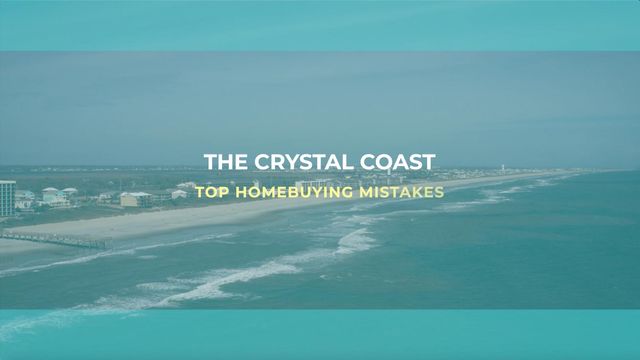Creative financing - what it is and how can you use it to buy a beach home
This article was written for our sponsor, Linda Rike Real Estate.
Buying a home doesn't have to be as cut-and-dry of a process as people might think. While it's true it's always helpful to have a 20 percent down payment, sometimes you can get creative when it comes to sourcing that money.
For buyers who already own a home, taking out a home equity line of credit can help finance their next vacation home or rental — and make their money work for them.
"Kelinda Rike really was the driving force, because she said, 'Your money's being lazy. Your house is paid for, the money is sitting there — you should just take the equity you have in this house and buy some investment properties,'" said Kirby Masters, a Carteret County resident and former client of Linda Rike Real Estate. "She set us up with a great broker, who did a lot of the legwork for us. We had to do appraisals and stuff, just like people would when normally buying a house, but through that initial line of credit, we've been able to buy two properties. Between the two properties combined with the rentals, it's able to essentially cover our mortgage."
For those who already have a home, taking out a line of credit is a practical way for homeowners to gain access to cash. Most homeowners commonly use equity to make improvements and upgrades to their home but for those looking to make a larger investment, equity can also be used for a down payment on a second home.
A mortgage broker is an invaluable part of the process, often helping to get the money secured and the job done faster than a bank would.
"A mortgage broker is pivotal in the transaction process because they're just as motivated to close your loan as you are. They get paid by the transaction, so they're more motivated to close your loan and answer your phone calls, even if it is on the weekend," said Rike. "You're probably working during business hours, so you don't necessarily get to stop and handle your own personal business during business hours. A mortgage broker is going to answer the phone, and they're going to take care of you on the weekends, while the bank will probably be closed."
For buyers who are interested in taking out a line of credit on a property, they shouldn't bite off more than they can chew — in fact, many lenders won't allow them to, anyway. Before the line of credit is approved, a mortgage broker will organize an appraisal.
To calculate the equity buyers can receive, brokers will subtract the mortgage balance from the home's appraised value. If homeowners don't already have 20 percent equity, they may not approve the line of credit.
Additionally, brokers will look at a homeowner's debt-to-income ratio — the amount of money spent each month on debt versus the amount of money brought in — to determine if they could handle additional payments. If that ratio is below a certain percent, potential buyers may not qualify.
That's why, when it comes to creative financing, it's crucial to plan ahead and know your limits. After all, since your home serves as collateral, you risk losing your property if you overstretch your finances.
"I was very hesitant to take out a line of equity because we could potentially lose our home — it's a little scary to take that risk on. But I'm totally glad we did because it's put us in a good position," said Masters. "As long as you're smart about it and factor in how much money you need and how much the payments will be, it's worth it. It's all about doing your homework."
Real estate professionals like Rike tend to agree with Masters, seeing the reward as worth far more than any potential risks.
"If you've got a house that's fully paid off, then you've got liquid cash sitting there taking a nap. You take that cash out, buy the next house, and fix it up — because you don't make money buying real estate, you make money selling or renting it," said Rike. "Hypothetically, if you've got a $300,000 house that's fully paid off, then what good is that money doing for you? If you pull out the $300,000, you buy a condo or a house and you rent it out, then somebody else is paying it off for you."
"You just keep going and give it about two years' worth of collecting rent, then you buy the next one," she finished. "Before you know it, you've got all these properties sitting there, and you can sell every single one of them to put the kids through college or pay for retirement and not have to worry."
Not only can creative financing help grow your wealth, but it's also one of the safer forms of investing. Even amidst a pandemic, real estate has been thriving, with some areas experiencing some of the highest home prices they've seen in years.
The sooner homeowners start letting their money work for them, the more they'll end up accumulating in a nest egg for later.
"Real estate typically goes up three to five percent every year, and then, on the other hand, the stock market's very volatile," said Rike. "Real estate has these highs and lows as well, but you can almost guarantee as long as you buy it right to begin with, listen to someone who knows what they're talking about, and take their advice, you're going to be set for the future."
This article was written for our sponsor, Linda Rike Real Estate.











